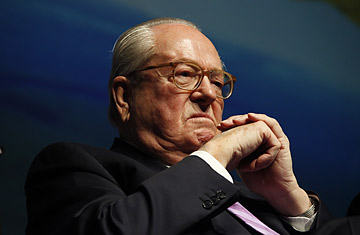
E.U. parliamentarians hope to deny Le Pen his moment as president.
As anyone who's ever been around a disruptive child knows, refusing to give the kid attention is often the best way of shutting the troublesome tot up. Perhaps that's a tactic members of the European Parliament regret not using with France's extreme right leader Jean-Marie Le Pen this week.
The trouble began when centrist and leftist politicians realized that Le Pen, 80, was now the eldest member in the parliament. That distinction brings with it the ceremonial presidency during the opening session of every new European Parliament. Determined to stop Le Pen taking the role during parliament's next inaugural session in July, his opponents have begun an energetic drive to alter the rule. (Read a TIME story on Le Pen.)
That effort has stirred Le Pen, who sat in France's parliament for seven years, from a relative silent spell. During a session of the European Union's legislature on March 25, Le Pen repeated his notorious contention that "the gas chambers were a detail of Second World War history". The first time Le Pen made that claim, in 1987, he was convicted in both France and Germany for violating laws banning racist and anti-Semitic hate-speech. In repeating the scandalous notion in Strasbourg Wednesday, Le Pen sought to justify his initial voicing of it by describing it as merely a "statement of fact". (See pictures of the Nazis in Paris.)
The reaction of Le Pen's fellow MEPs was one of indignation and rage. Backed by a huge majority of legislators, the push to deny the French politician his moment as president now looks a virtual certainty. "Mr Le Pen's negationist remarks, reiterated once again in the European Parliament, disqualify him from chairing the inaugural session of our institution for even a second," said Joseph Daul, the French leader of the Christian Democrats in the parliament. "In this symbol of the reconciliation of European people, it would be an extremely bad signal for our citizens and the world," agreed Martin Schultz, leader of Socialist Euro MPs. "As a German, I have a duty to fight this."
But while the battle may invoke a sense of duty, it also affords Le Pen some rare time in the spotlight on his own terms. Ever since his stunning success in qualifying for France's presidential run-off in 2002, Le Pen has reached the headlines mostly for his steady electoral decline. Conservative politicians like President Nicolas Sarkozy have successfully wooed hard-right voters by gravitating toward Le Pen's positions on issues like immigration and fighting crime. (See pictures of Sarkozy.)
To avoid bankruptcy last year, Le Pen's National Front party sold its headquarters in the tony Paris suburb of Saint-Cloud to Chinese buyers. Until this week's brouhaha, Le Pen had been focused on making way as leader for his daughter Marine. Other would-be successors, who believe the younger Le Pen is too moderate, have decried the plan. Now the controversy in Strasbourg has allowed Le Pen to re-assume center stage.
